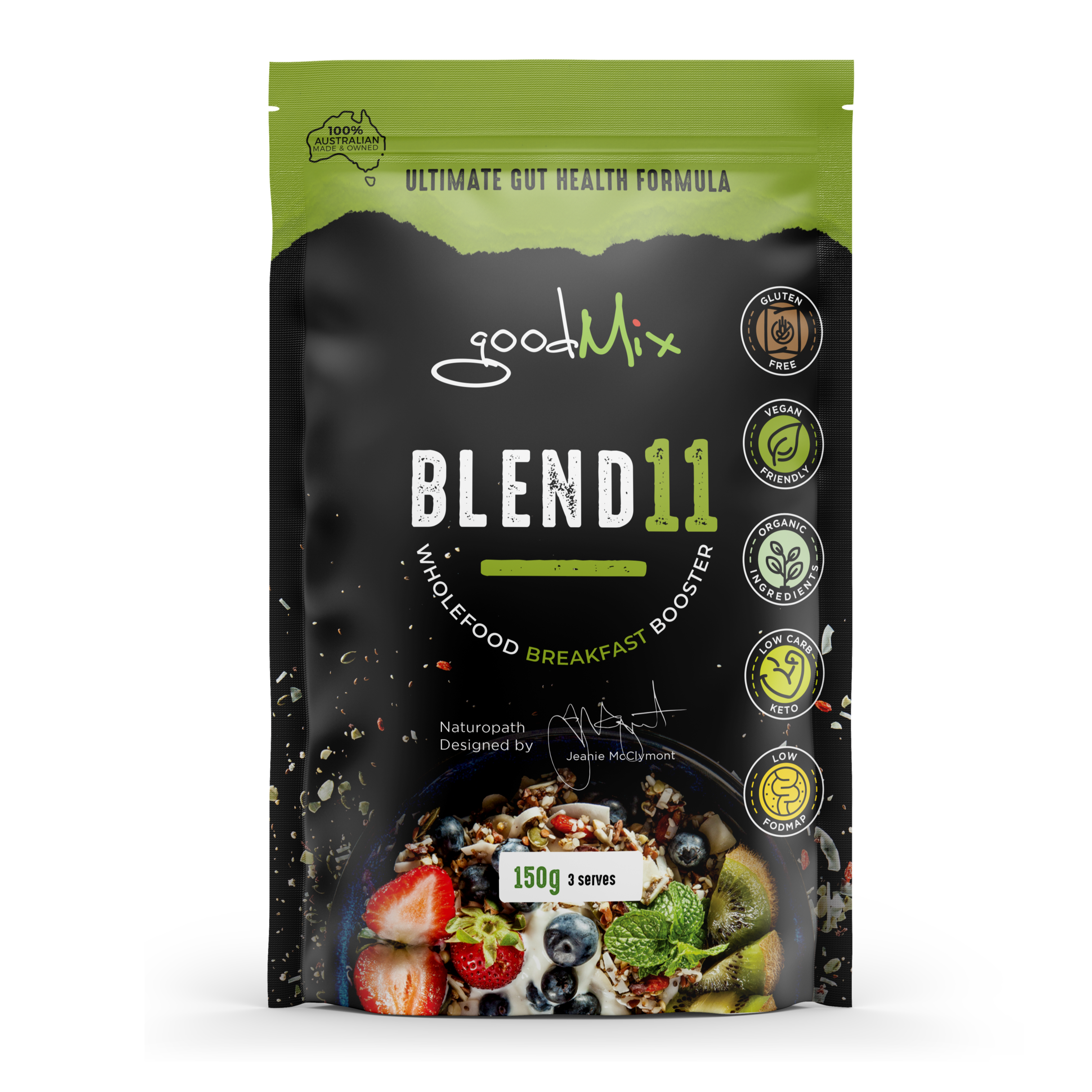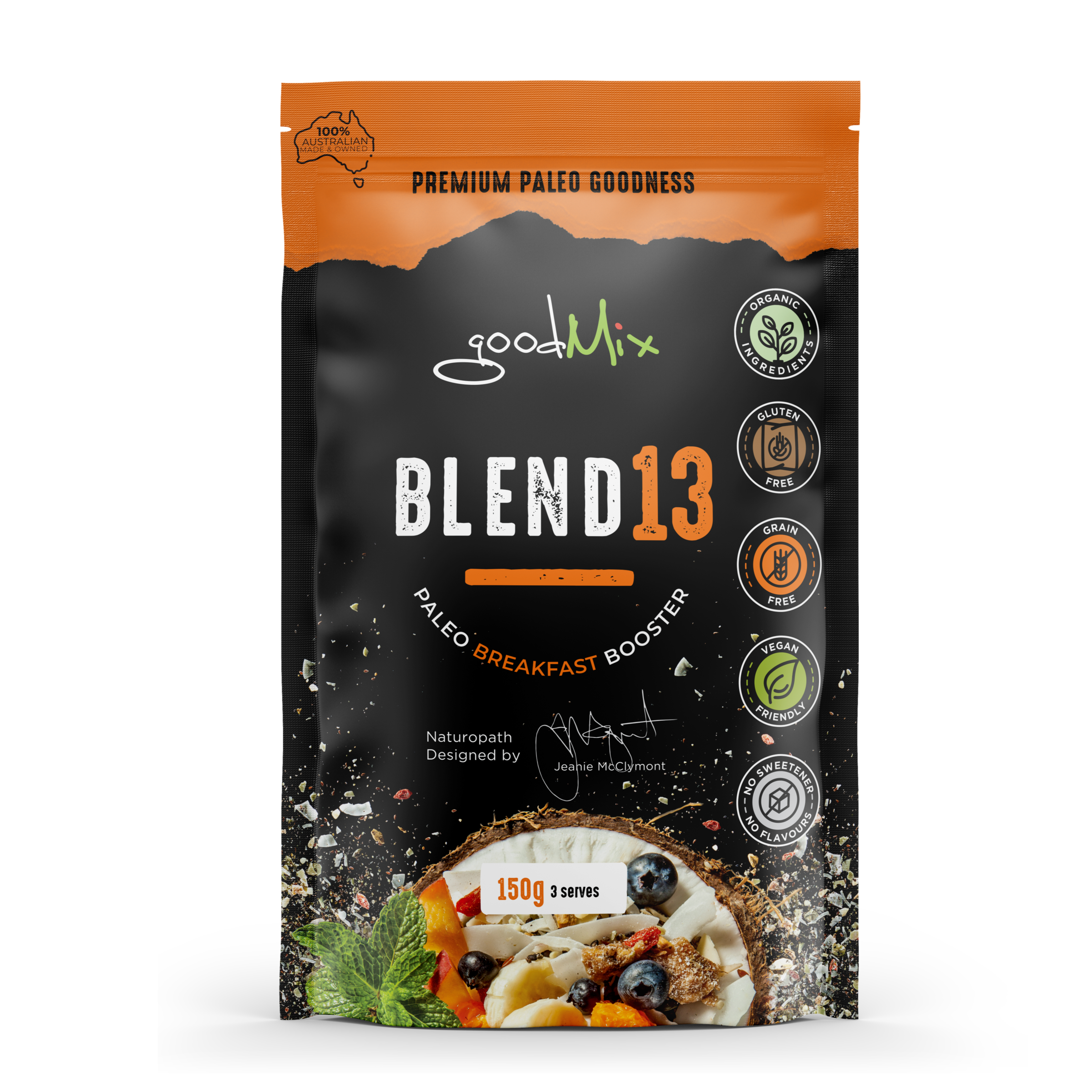
Is Gluten Bad For You? 5 Potential Benefits Of A Gluten Free Diet
Over the last 15 years, gluten-free diets have skyrocketed in Australia, fuelled by celebrity endorsements, wellness influencers, and a growing awareness of gluten-related health issues. Supermarket shelves are now packed with gluten-free alternatives, catering not only to those with coeliac disease, but also to people seeking other health benefits. But is gluten really bad for you? What effect does it have on your body, and what are the potential benefits of eliminating it from your diet?
If you have no health issues or no known problems with gluten, you might be sick of seeing 'Gluten Free' plastered all over everything in supermarkets, restaurant menus, health stores, pharmacies, online - even on products with no link to grains! GF is a pretty hot label to have on your product at the moment from a marketing perspective! So…is it a fad? Or should you actually be avoiding gluten too? Let’s take a look at what gluten actually is first.
What Is Gluten?
Gluten is a group of proteins found in grains such as wheat, barley, rye and spelt. It gives dough its elastic texture and helps bread rise, making it a staple in baked and processed foods. It’s found in many foods such as bread, pasta and cereal and provides no essential nutrients (just that delicious texture)!
Gluten proteins (especially from modern hybridised wheat strains) are difficult to break down, and increase gut permeability, which causes leaks from the digestive tract into the bloodstream, triggering significant inflammation and immune responses in some people, as indicated by those diagnosed with coeliac disease and other gluten-related conditions.
While gluten seems relatively harmless for many people, its impact on health has become a topic of growing interest and debate, particularly with the rise of gluten-free diets. But is gluten bad for you? Let’s explore what gluten does to your body, and who benefits most from cutting it out.
What Gluten Does to Your Body
Most of us have a vague understanding that it's really bad for coeliacs and a little bad for some other sensitive folks, but what about the rest of the population? The simple explanation is that gluten is detrimental to your gut integrity - it actually causes a degree of 'leaky gut' in everyone - but only some people get obvious symptoms, and some of us can just ‘handle it’ better than others - due to things like our general diet, stress levels, our gut bacterial balance, our immune function, our genetic makeup and susceptibilities and our overall health and vitality.
Gluten Inflammatory Response
Our ability to 'handle' gluten is largely our ability to quickly and continuously heal that leaky gut after repeated gluten exposure, to avoid the immune / inflammatory consequences of having uninvited 'big food bits' getting into our bloodstream (they’re not supposed to fit through the semi-permeable gut barrier). We all have different tolerance levels, but it's really common to hear 'I used to be fine with gluten but I just don't feel good now when I have it' or 'I feel heaps better now I'm GF' or 'I can tell that there was gluten in that meal because of how I feel' or ‘my weight / inflammation / brain fog is better when I’m GF”.... it's just more common nowadays for people to experiment with eating GF, so there's much more awareness of the effects on individuals. Frequency of consumption, balance of gut microbiome, other inflammatory aspects of diet, medications, immune health etc can all play a role in gluten sensitivity too.
Who Should Definitely Avoid Gluten
1. Those With Coeliac Disease:
Coeliac disease is an autoimmune disorder. About 1.4% of Aussies have been diagnosed as coeliac, but studies show that there’s almost that many again, currently undiagnosed (the total percent is more like 2-2.5%). For those with coeliac disease (diagnosed or not) consuming gluten triggers the immune system to attack the lining of the small intestine, specifically the villi—tiny, finger-like projections responsible for nutrient absorption. Over time, this damage can lead to severe malnutrition, anaemia, osteoporosis and a range of gastrointestinal and systemic symptoms (not to mention pain, bloating, irregular bowels, brain fog etc etc). Having Coeliac disease often comes with other ‘bonus’ auto-immune issues too.
If you suffer any of the following, you should be tested:
- Chronic diarrhoea or constipation
- Bloating and abdominal pain
- Unexplained Fatigue
- Weight loss
- Mouth ulcers
- Skin rashes (dermatitis herpetiformis)
Coeliac disease is diagnosed through a combination of blood tests and a biopsy of the small intestine, and the only current treatment is a lifelong gluten-free diet.
2. Individuals with Non-Coeliac Gluten Sensitivity (NCGS):
Non-coeliac gluten sensitivity is a condition in which people experience adverse reactions to gluten without the autoimmune damage seen in coeliac disease or the allergic response seen in wheat allergy. While NCGS remains less well-understood, research suggests it may involve an innate immune system response.
Symptoms of NCGS often mimic those of coeliac disease and include:
- Bloating and abdominal discomfort
- Headaches
- Fatigue
- "Brain fog" (difficulty concentrating or thinking clearly)
- Joint and muscle pain
- Skin issues
- Inflammatory weight gain
- Other auto-immune issues
There is no specific test for NCGS; it is typically diagnosed through an elimination diet, where symptoms improve upon removing gluten (for an extended time, usually months) and return upon reintroducing it.
3. People with Wheat Allergy:
A wheat allergy is a classic allergic reaction in which the immune system identifies wheat proteins, including gluten, as harmful and releases histamine. This reaction can range from mild to life-threatening (anaphylaxis). Wheat allergy is more common in children, and some will outgrow it by adulthood.
Symptoms may include:
- Hives or skin rashes
- Nasal congestion
- Wheezing or difficulty breathing
- Nausea and vomiting
- Anaphylaxis (in severe cases)
Unlike coeliac disease, a wheat allergy is not specific to gluten alone and may also require avoiding other wheat components.
4. Those with Irritable Bowel Syndrome (IBS):
IBS is a common gastrointestinal disorder that affects how the gut and brain work together, resulting in symptoms like abdominal pain, bloating, and changes in bowel habits. Some people with IBS find that gluten-containing foods exacerbate their symptoms. While this is not due to an immune reaction to gluten itself, the protein may act as a trigger for gut dysfunction in susceptible individuals.
For some, eliminating gluten as part of a low-FODMAP diet (which reduces fermentable carbohydrates) can significantly reduce symptoms. Some will find that ‘it wasn’t the gluten, it was the FODMAPs’) - they can normally then eat spelt bread without symptoms, (which has gluten, but is lower in FODMAPs than regular wheat).
5. People with Autoimmune or Inflammatory Conditions
Research has also identified a link between gluten consumption and increased inflammation in people with autoimmune diseases such as rheumatoid arthritis, lupus, and multiple sclerosis. While these individuals do not necessarily have coeliac disease, gluten may greatly exacerbate inflammatory processes, worsening symptoms like joint pain, brain fog, frequent colds and flus, skin issues or fatigue.
Additionally, gluten has been implicated in conditions like Hashimoto's thyroiditis (autoimmune thyroid disease) and type 1 diabetes, where eliminating gluten might help reduce immune system activity.
Why These Groups Struggle with Gluten
The adverse reactions to gluten in these groups stem from a variety of mechanisms:
- Immune-mediated reactions: Seen in coeliac disease, NCGS and wheat allergy, where the immune system identifies gluten as a threat.
- Increased gut permeability: Gluten can contribute to "leaky gut" allowing harmful substances to pass into the bloodstream and trigger inflammation.
- Digestive challenges: Many individuals lack the stomach acid and enzymes required to fully break down gluten proteins, leading to discomfort and bloating. As we age, or when stressed, we produce less of these (so even if gluten was a non-issue, it can become one).
Advantages of Eating Gluten Free
So if we know that gluten causes a degree of ‘leaky gut’ in everyone, is there not an argument that we may all benefit from a gluten-free diet? If you’re looking to build gut health, then yes. The reality is that foods containing gluten are usually highly processed, high in calories, sugar and unhealthy fats - think pastries, bread, biscuits, cakes, pizza etc.
Cutting out wheat and gluten certainly won’t cause any adverse health effects as long as they’re replaced by natural, healthy nutritious whole foods. So what are the potential health benefits of a gluten-free diet?
5 Potential Benefits of a Gluten-Free Diet
1.Improved Digestive Health
For individuals with gluten sensitivities, coeliac disease or irritable bowel syndrome (IBS), removing gluten from the diet can alleviate symptoms like bloating, diarrhoea, constipation and abdominal discomfort.
How It Works: Gluten can trigger inflammation or irritation in the gut lining for sensitive individuals, leading to digestive issues. Eliminating gluten allows the gut to heal, particularly in cases of coeliac disease where the small intestine has been damaged.
Additional Impact: Even those without a diagnosed sensitivity might experience improved digestion when gluten is replaced with whole, naturally gluten-free foods, as these are often higher in fibre and less processed.
2. Enhanced Energy Levels
Fatigue is a common complaint among individuals with undiagnosed gluten-related disorders. A gluten-free diet can lead to more consistent energy levels.
How It Works: In coeliac disease, gluten-induced damage to the gut impairs nutrient absorption, leading to deficiencies in iron, B vitamins, and other energy-critical nutrients. Eliminating gluten allows for better nutrient uptake and a reduction in chronic fatigue.
Why It Matters: Even people without coeliac disease may find that avoiding gluten helps stabilise blood sugar levels, or drop kgs, as gluten-free diets often exclude processed foods with added sugars and refined carbohydrates, which can cause energy crashes, diabetes, and weight gain.
3. Reduced Inflammation
Chronic inflammation underpins many autoimmune, metabolic and inflammatory conditions, and gluten is a known trigger for inflammation.
How It Works: Gluten consumption in people with coeliac disease or non-coeliac gluten sensitivity triggers immune responses that can lead to systemic inflammation. By removing gluten, inflammatory processes are reduced, leading to fewer symptoms like joint pain, swelling, brain fog and fatigue.
Additional Benefits: This reduction in inflammation will benefit individuals with autoimmune diseases like rheumatoid arthritis or Hashimoto’s thyroiditis, even if they are not strictly gluten intolerant.
4. Clearer Skin
For some, adopting a gluten-free diet has noticeable effects on skin health. Conditions like eczema, psoriasis and acne may improve after eliminating gluten.
How It Works: Gluten sensitivity or coeliac disease can manifest through skin conditions such as dermatitis herpetiformis (a specific rash linked to gluten). Reducing gluten intake decreases inflammatory responses that can aggravate these symptoms.
Added Benefit: A gluten-free diet involves cutting out many processed foods, which are also high in sugar and trans fats—two dietary components known to majorly compromise skin health.
5. Weight Management
Switching to a gluten-free diet can contribute to healthier eating habits and better weight control.
How It Works: Many gluten-containing foods are highly processed and calorie-dense, such as bread, pastries, biscuits, cakes and pastas. Eliminating these and focusing on whole, naturally gluten-free foods like fruits, vegetables, and lean proteins can lead to healthier caloric intake and improved metabolism, with reduced diabetes and cardiovascular risk.
Why It Helps: Gluten-free diets encourage mindfulness in eating, as individuals must pay close attention to ingredient labels and food quality. This shift often results in more nutrient-dense and satisfying meals that support weight management.
While a gluten-free diet offers these potential benefits, it’s important to approach the transition thoughtfully:
Focus on whole, unprocessed foods rather than heavily processed gluten-free ‘replacement’ products, which can be high in sugar, refined carb, and low in nutrients.
Ensure you maintain a balanced diet that includes all essential vitamins and minerals, especially fibre, which can be reduced when eliminating gluten-containing whole grains.
The whole goodMix range of naturopath-designed products are gluten free. In fact from the feedback we get, Blend11 seems to be very IBS-friendly (GF, very low in carbs / sugars and Low FODMAP). Specially formulated for anyone wishing to support healthy, comfortable digestion & metabolism and for those following the ‘Low FODMAP Diet’ as part of their IBS management plan, Blend11 may very well help ease your symptoms.
- Blend11 = low FODMAP, GF gut microbiome support (in a filling, nourishing, low carb, high protein, high omega and antioxidant blend)!
- Greens + Aloe = support for the gut lining, easy to digest macro and micronutrients, extra antioxidants, great for blood sugar, liver and lymphatic support.
- Burger Mix & Bliss Ball Mix = make it super easy for people to add more diverse fibre in to support the microbiome and gut lining (replace the not-so-healthy treats and burgers!)
- Blend13 offers a completely grain free alternative for those who are super reactive or who are following a grain free / strict paleo eating protocol.
Why not give GF a go and let us know how you get on…(note - if you have any of the symptoms mentioned, and have not yet been tested for coeliac disease, do that first, as a priority). Remember - approx half the suspected cases of coeliac disease are undiagnosed.




